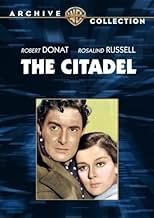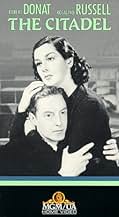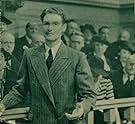IMDb-BEWERTUNG
7,0/10
2512
IHRE BEWERTUNG
Füge eine Handlung in deiner Sprache hinzuAn enthusiastic young doctor happily embarks on his career, but it isn't long before he finds out what being a doctor really entails.An enthusiastic young doctor happily embarks on his career, but it isn't long before he finds out what being a doctor really entails.An enthusiastic young doctor happily embarks on his career, but it isn't long before he finds out what being a doctor really entails.
- Für 4 Oscars nominiert
- 9 Gewinne & 4 Nominierungen insgesamt
Penelope Dudley-Ward
- Toppy LeRoy
- (as Penelope Dudley Ward)
Francis L. Sullivan
- Ben Chenkin
- (as Francis Sullivan)
Empfohlene Bewertungen
I wasn't too sure what to think of Vidor after Our Daily Bread. Usually, filmmakers who have a message to get across, and who don't do it all that subtly, rub me the wrong way. But after seeing The Citadel i'm starting to rethink King Vidor. Indeed i thought Our Daily Bread a very fine film, certainly from the standpoint of direction. But what Bread lacked in the two lead performances (which are quite corny and camp), has been perfected in The Citadel, where we are given two marvellous performances from Robert Donat and Rosalind Russell. And i didn't have the same feeling about Vidor's message-making in Citadel that i did in Bread. It is more subtle in Citadel, and also for a better cause (altruism in the medical profession, a very noble thing, as opposed to socialism, the subject preached about in Our Daily Bread). But now i've started thinking this about Vidor:
He was a passionate artist - how much do i prefer this to someone like Rossellini who didn't think much of movies, or someone like Bergman, who often (he can be optimistic) depicts human nature as an empty, valueless abcess. The fact that he expresses such strong messages, and that in fact he has something that he finds of value, is immensely reassuring. I get so used to railing against preachy filmmakers that i seem to equate non-preachiness with cynicism, and even nihilism. Well, one doesn't have to dispise everything to make a wonderful film, which is what Vidor has done here.
Everything works in The Citadel. It draws you very nicely, without pomp or flashiness, but with immense skill, into its environment, and what a lovely environment it is. You so badly want nothing bad to happen to earnest, idealistic young doctor's assistant Dr Andrew Manson. I hesitate to use the word perfection, but there is a real perfection to this movie. And i was more than a little bit moved by it. I really enjoyed it, i just thought it was wonderful. Mr Vidor really was a king.
He was a passionate artist - how much do i prefer this to someone like Rossellini who didn't think much of movies, or someone like Bergman, who often (he can be optimistic) depicts human nature as an empty, valueless abcess. The fact that he expresses such strong messages, and that in fact he has something that he finds of value, is immensely reassuring. I get so used to railing against preachy filmmakers that i seem to equate non-preachiness with cynicism, and even nihilism. Well, one doesn't have to dispise everything to make a wonderful film, which is what Vidor has done here.
Everything works in The Citadel. It draws you very nicely, without pomp or flashiness, but with immense skill, into its environment, and what a lovely environment it is. You so badly want nothing bad to happen to earnest, idealistic young doctor's assistant Dr Andrew Manson. I hesitate to use the word perfection, but there is a real perfection to this movie. And i was more than a little bit moved by it. I really enjoyed it, i just thought it was wonderful. Mr Vidor really was a king.
A look at the medical profession today will convince anyone that this narrative of the conflict a sensitive young physician experiences: whether to serve the not-especially-appreciative poor or the hypocond- riac and over-appreciative wealthy, if he caters to their whims. (At the end one wonders how great a difference there is between these two constituencies.) How many medical school graduates today choose to into small-town or rural general practice, as opposed to pursuing lucrative specialist careers? Robert Donat's effective performance is, as usual, understated; while Rosalind Russell easily matches him in a portrayal that makes one regret that she later became typed in comic roles as a result of superb performances in that genre. A supporting cast that includes the youthful Rex Harrison, Emlyn Williams and Ralph Richardson, all early in their careers and all with perfectly formed characteriza- tions, gives the film depth that one might not have anticipated. This is one of those films that makes one regret the loss of the old studio system, which enabled MGM, with its guaranteed bookings, to make a prestige film on a serious social issue with relatively few melodramatic excesses; and to offset probable box office losses by the studio's many box office bonanza romantic, comic or musical star vehicles. And today??
Very good film from King Vidor with a great look and a mostly excellent cast, take from the classic novel by A Cronin. Robert Donat as Dr. Manson, a highly-principled physician who struggles with the conflicting demands of his profession, provides an uneven central performance. It is sometimes hard to understand his motivations and this is the film's biggest weakness. Rosalind Russell does a fine job as his ever-faithful, often suffering wife. Her performance is perfect, and does provide a moral core to the film. The film wisely avoids a lot of details of the novel that would have muddied up the storyline. (In the book, Dr. Manson has an affair with one of society patients.) The film also boasts some fine performances from a very young Rex Harrison and Ralph Richardson. In fact, Richardson's role as an idealistic, though flawed doctor steals the spotlight every time he is on the screen. The film also has a great look, especially the outdoor scenes of the British villages.
This film features an excellent cast, ably led by Robert Donat in a performance that is superior to his marvelous performance one year later in Goodbye, Mr. Chips. As a young doctor, he begins with the highest intentions, gradually becoming cynical and disillusioned. He decides it's better to have money than scruples, with predictable results. Outstanding work as well by Rex Harrison and Rosiland Russell and a very good script. Most recommended.
A.J. Cronin's book "The Citadel" was adapted for a 1938 film starring Robert Donat, Rosalind Russell, Ralph Richardson, Rex Harrison, and Emlyn Williams, directed by King Vidor.
Donat plays Andrew, a young, idealistic new doctor who goes to work in a small Welsh mining town, where he marries a pretty schoolteacher, Christine (Rosalind Russell). Many of the miners have a persistent cough, and he becomes interested in finding the cause. But the miners have little understanding of the big picture and just want the "pink medicine" the old doctor gave them, which just helped their symptoms.
Thwarted at every turn, Andrew and Christine move to London, where Andrew opens a practice. Then he has a change of fortune when he runs into an old friend (Rex Harrison) who gets him on the society doctor track, where he gets big money for treating hypochondriacal patients and by merely being present while a surgery is being performed, or taking a referral.
A beautiful movie with the underrated Donat turning in a wonderful performance of quiet intensity. Russell's expressions say more than her words - you know exactly how she's feeling. Ralph Richardson -- was he ever bad? - plays Andrew's old friend Denny, who notices the change in Andrew's goals.
A.J. Cronin was one of the authors whose novels were often adapted for film in the old days: "The Spanish Gardener," "The Green Years,", "Keys of the Kingdom," "Bright Victory," "Vigil in the Night," and others. Some of his stories involve medicine/science and sacrifice/dedication. Those books made for some inspiring films in the '30s and '40s.
Donat plays Andrew, a young, idealistic new doctor who goes to work in a small Welsh mining town, where he marries a pretty schoolteacher, Christine (Rosalind Russell). Many of the miners have a persistent cough, and he becomes interested in finding the cause. But the miners have little understanding of the big picture and just want the "pink medicine" the old doctor gave them, which just helped their symptoms.
Thwarted at every turn, Andrew and Christine move to London, where Andrew opens a practice. Then he has a change of fortune when he runs into an old friend (Rex Harrison) who gets him on the society doctor track, where he gets big money for treating hypochondriacal patients and by merely being present while a surgery is being performed, or taking a referral.
A beautiful movie with the underrated Donat turning in a wonderful performance of quiet intensity. Russell's expressions say more than her words - you know exactly how she's feeling. Ralph Richardson -- was he ever bad? - plays Andrew's old friend Denny, who notices the change in Andrew's goals.
A.J. Cronin was one of the authors whose novels were often adapted for film in the old days: "The Spanish Gardener," "The Green Years,", "Keys of the Kingdom," "Bright Victory," "Vigil in the Night," and others. Some of his stories involve medicine/science and sacrifice/dedication. Those books made for some inspiring films in the '30s and '40s.
Wusstest du schon
- PatzerWhen Andrew examines Christine's throat, he sits in front of a light that is supposedly reflected into Christine's mouth by his eyepiece. We see this from over Andrew's shoulder, and when the light is directed into her mouth, it is clearly coming from behind Andrew, because the back of his eyepiece is illuminated.
- Zitate
Christine Barlow Manson: Andrew, Do you remember once telling me that a all good research man needed was a notebook, a microscope and a room with a roof over it?
- Crazy CreditsPrologue: "This motion picture is a story of individual characterizations and is in no way intended as a reflection on the great medical profession which has done so much towards beating back those forces of nature that retard the physical progress of the human race."
- Alternative VersionenAlso shown in computer colorized version.
- VerbindungenFeatured in The Ultimate Film (2004)
Top-Auswahl
Melde dich zum Bewerten an und greife auf die Watchlist für personalisierte Empfehlungen zu.
- How long is The Citadel?Powered by Alexa
Details
- Erscheinungsdatum
- Herkunftsland
- Sprache
- Auch bekannt als
- La ciudadela
- Drehorte
- Abertillery, Blaenau Gwent, Wales, Vereinigtes Königreich(Village scenes)
- Produktionsfirma
- Weitere beteiligte Unternehmen bei IMDbPro anzeigen
- Laufzeit
- 1 Std. 50 Min.(110 min)
- Farbe
- Seitenverhältnis
- 1.37 : 1
Zu dieser Seite beitragen
Bearbeitung vorschlagen oder fehlenden Inhalt hinzufügen






































